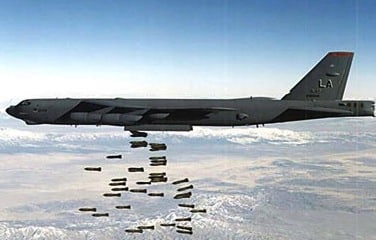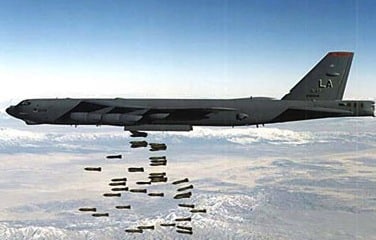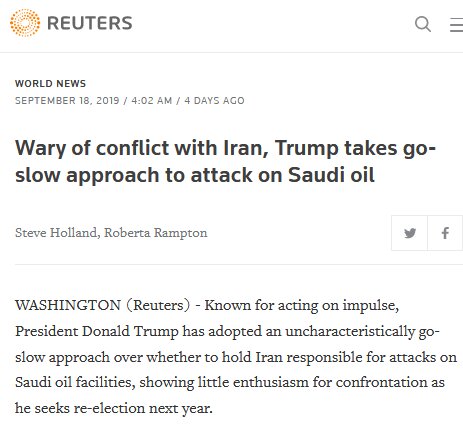TEHRAN- Some in the mainstream western media are lamenting why US President Donald Trump is dragging its feet to march off to another open-ended military conflict in the Middle East, after days of reckless efforts to implicate Iran in the September 14 Yemeni attacks into Saudi oil installations.
The MSM outlets are repeating that Iran was behind the attack, despite the fact Iranian complacency with the Yemeni strike has not yet been publicly demonstrated.
They are following in the footsteps of US Secretary of State Michael Pompeo, who has put American credibility on the line by accusing Iran of perpetrating an “act of war”.
The attack, the latest in a series of strikes into key Saudi Arabian targets this year, was launched from south-western Iran using drones and cruise missiles, according to the American narrative.
This is while the Yemeni Houthi movement has claimed responsibility for the attacks, explaining in detail how the assaults were carried out.
The strike fits a pattern of Yemeni strikes against Saudi economic infrastructure, and it follows Yemeni threats made last month.
There is no plausible reasons to believe Iran was behind the attacks, and it’s even unclear if Iran has indirectly played a role in the attacks.
Although the US government and establishment media often call the Houthis a proxy of Iran, the fact is this is an independent force grown out of decades-long conflicts in Yemen.
The extent to which Iran offers support to the Yemeni forces has never been established.
Anyway, even if factual evidence does emerge that Iran has provided weapons used in the attack, there would be much less actual guilt on the part of Tehran than what the western outlets say. Why would this justify a US military response?
Assemblage of junk
Surprisingly, neither the US nor Saudi Arabia have so far presented a shred of credible evidence proving Iran launched the attack on Aramco.
In a press conference Wednesday night, Riyadh put on display a wreckage of what it said were remnants of weapons used in the attacks
In the show, the Saudi Defense Ministry Spokesman Turki al-Maliki claimed the wreckage showed the attacks were “unquestionably sponsored” by Tehran.
But many believe the assemblage of junk were not that much-anticipated “concrete evidence” Saudi officials had vowed to provide.
Al-Maliki did not say what area the strikes were fired from, just asserting they “could not have originated in Yemen”.
Separately, Saudi Arabia’s Minister of State for Foreign Affairs Adel al-Jubeir on Saturday showed he is clueless about the perpetrator of the attacks.
Al-Jubeir said Riyadh would take the appropriate steps if its investigation confirmed that the attacks were launched from Iranian soil.
“The kingdom will take the appropriate measures based on the results of the investigation, to ensure its security and stability,” al-Jubeir told a news conference.
Reuters eggs on war
However, it seems Reuters and other western outlets are bent on nudging the idea of war forward, picking up the anti-Iran narrative and running with it.
The corporate media is having the false accusations repeated until the need for Iran attack becomes consensus reality in the west.
Of dozens of Reuters articles on the Aramco attack, almost all take Iran’s involvement in the attack for granted.
The articles generally repeat the same demonology pro-war voices offered for years to try to justify an attack on Iran.
A Friday piece, titled “United States sending troops to bolster Saudi defenses after attack”, says the US officials have told Reuters southwest Iran was the staging ground for the attack that might has been “authorized by Iran’s Supreme Leader Ayatollah Ali Khamenei.”
The article says this is “an assessment based at least in part on still-classified imagery showing Iran appearing to prepare an aerial strike”.
But the agency doesn’t explain why the evidence that reportedly justify an attack to a sovereign country are still classified.
The article also says the Pentagon’s late Friday announcement that it will send some troops to Saudi Arabia to bolster defense systems “appeared to close the door to any imminent decision to wage retaliatory strikes against Iran following the attack”.
Ouch! Isn’t it too bad that the doors to “retaliatory strikes” are closed?
The title of a Saturday column says, “Saudi oil attack shows how Iran sees new Mideast game”.
This column clearly suggests Iran was behind the attack. A paragraph says,” Iran has been testing drones and supplying them to regional allies such as Hezbollah for years. This attack, however, showed significant recent progress. That the missiles were reportedly able to evade Saudi air defenses by flying behind them demonstrates striking sophistication”.
A Thursday article reads, “Saudi Arabia shows attack site damage as Iran pledges tough defense”.
This article relates a Saudi-organized tour of the damaged facilities for western reporters to Friday remarks by an Iranian official that Iran would give firm response to any US military plot in the region.
This is also the case with two other articles, titled “Iran says it will destroy any aggressor” and “Iran navy commander says Iran ready to defend its marine borders”.
Both articles link pledges by Iranian commanders to defend Iranian territory, made in speeches on the occasion of the 39th anniversary of the beginning of the Iraqi invasion of Iran, to the Aramco attacks.
Striking example
Perhaps no article demonstrates the Reuters pro-war stance than a major piece released early on Wednesday.
In the article, published hours before Saudi Arabia held its news conference, Reuters lamented why Trump was not taking action immediately.
The title is provocative enough: ”Wary of conflict with Iran, Trump takes go-slow approach to attack on Saudi oil”.
Reuters reports Trump has adopted an “uncharacteristically go-slow approach” over whether to “hold Iran responsible” for attacks on Saudi oil facilities, apparently because he “seeks re-election next year” and he is “famously skeptical of his intelligence community”.
But one can hardly conclude Trump’s approach towards the Sept. 14 attacks was “uncharacteristically go-slow”, taking into account Trump’s approach to the explosions off the coast of the UAE’s Fujairah in May, the attacks on two oil tankers in the Gulf of Oman mid- June and the shootdown of a US spy drone inside Iranian territory late June.
Probably in all cases there was “no doubt” that Iran was the culprit – although even stanch allies of the US wanted clear evidence – but Trump reportedly decided to back down.
The Reuters piece itself mentions Trump’s behavior towards Venezuela, reporting Trump has resisted suggestions for a “stronger focus on military planning” while a US-led campaign of economic and diplomatic pressure has failed to “rescue” its people by toppling the Venezuelan government.
Reuters continues, “Trump’s stance today is in stark contrast to 2017, less than three months into his presidency, when he waited only two days before launching air strikes to punish Syrian President Bashar al-Assad’s forces for a chemical weapons attack.”
Wait a minute. Was Trump entitled to bombard Syria as a punishment for a “chemical weapons attack”? Which global authority did sanction such attacks?
And there are no convincing proof to believe the Syrian government has ever committed chemical attacks.
CNN anchor echoes Reuters
Interestingly, a famous CNN anchor also egged on war with Iran, tweeting why Trump “balks” at military retaliation.
Trying to portray Trump’s picking of sanctions instead of airstrikes as a sign of weakness, CNN anchor Jim Sciutto replied with a carefully worded question: “does this mean the president is again balking at military retaliation?”
According to Sputnik, the purpose of Sciutto’s question is to frame Trump’s choice as between showing strength by ordering an airstrike – which seems to be the obvious decision for any red-blooded American – or weakness by “balking” at that option.
A love for war
Seemingly, the mainstream media loves it when the US bombs things.
The Trump-ordered missile strike on Syria’s Shayrat Air Base in April 2017 was widely admired by the MSM.
A day after the attack, CNN’s Fareed Zakaria said he thinks Trump had just “became President of the United States”, Washington Post columnist David Ignatius asserted “put more umph” back into “the credibility of American power,” and Fox News’ Jeanine Pirro claimed “We finally have a man who knows the difference between right and wrong and good and evil, and it makes us proud.”
Global Research and other respected alternative outlets have clearly demonstrated how big US outlets, including the New York Times, CBS, and CNN, sold the Iraq war to the American people.
“Such was the barrage of propaganda directed at the American public that 69% believed Saddam Hussein was personally involved in the September 11 attacks. That is a significant achievement in manipulation. The poll results must have been news to the Iraqi dictator himself, a forgotten one-time American ally,” Global Research reports.
The pattern continues into other illegitimate interventions, as the liberal Guardian newspaper championed the demolition of Libya in 2011, with editorials imploring, “The quicker Muammar Gaddafi falls, the better.”
Now one can better grasp why William Arkin, one of NBC’s political commentators, quit in January. In his resignation letter, Arkin denounced the network as a “cheerleader for open and subtle threat mongering,” full of people who “accept that a state of perpetual war” is a necessity.
Trump decided to impose yet another round of sanctions to punish the people of Iran for what there is no public proof of, but MSM outlets are furious that Trump has backed away from an all-out war.
Trump can be almost certain that the day he orders air strikes, the MSM will cheer the decision as “presidential”.
Reprinted with permission from Tehran Times.



